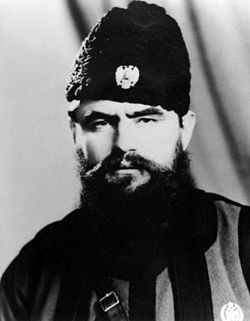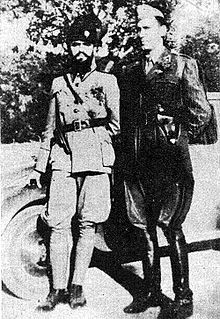- Momčilo Đujić
-
Momčilo R. Đujić
Момчило P. Ђујић
Nickname "Pop Vatra", "Vojvoda", "Vojvoda Momčilo" Born February 27, 1907
Topolje, Triune Kingdom of Dalmatia, Croatia, and Slavonia, Austria-HungaryDied September 11, 1999 (aged 92)
San Diego, California, USA[1]Allegiance Kingdom of Yugoslavia (nominally throughout WWII) Service/branch Yugoslav Army in the Fatherland Years of service 1941-1945 Rank Vojvoda (Duke) Commands held Dinara Division Other work Movement of Serbian Chetniks Ravne Gore Momčilo R. Đujić (Serbian Cyrillic: Момчило P. Ђујић ; February 27, 1907 - September 11, 1999) was a World War II Serbian commander in the Chetnik movement. He was initially an Orthodox priest, that after the assassination of the Yugoslav King joined the Chetniks, later commanding the Dinaric Division (Dinarska Divizija) during the Second World War, with the title of Vojvoda (Duke).
Contents
Early life
Đujić was born on 27 February 1907 in the village of Kovačić near Knin in Croatia, to father Rade and mother Ljubica, of Bosnian Serb origin.[2] The eldest child of the family, he grew up with four siblings - brothers Glišo and Boško, and sisters Mara and Ilinka. His primary education was completed in Knin. Đujić started secondary school in Šibenik, but left school and went to the Serbian Orthodox seminary in Sremski Karlovci, graduating in 1931. He was assigned to the Orthodox parish near his birthplace, where his passionate sermons won him the nickname of "Father of Fire" (Pop vatra).[1]
Priest and anti-Yugoslavianism
As an Orthodox priest, Đujić's first congregation was in the town of Strmica near Knin where his two sons and his daughter were born. Following the 1934 assassination of Yugoslav King Alexander and in anticipation of future ethnic conflict, Đujić met Serbian paramilitary leader and Chetnik movement president Kosta Pećanac. With aid from Pećanac's movement, he organized and began to arm 11 Chetnik bands in his region prior to the outbreak of the Second World War. He later said: "I knew that the country would not survive, because nobody can put Serbs and Croats in the same bag".[1]
World War II
Weeks after the establishment of the Independent State of Croatia, which was divided into German and Italian zones of occupation,[3] Đujić narrowly escaped capture by Croatian nationalist forces, and in the summer of 1941, organised a Chetnik detachment that seized the town of Drvar from the Ustaše.[1]
On August 13, 1941, at meeting with the Italians in the village of Pađeni, Đujić and other Serbian nationalists formed an agreement for collaboration.[2] On August 31, at a Drvar assembly, Đujić was given the task of stopping the advance of the Italians; he immediately afterwards made an agreement with the Italians granting them free passage.[2]
By June 1942, Đujić and other Chetnik leaders had reached co-operation agreements with the Ustaše, although these relationships were "based only on their common fear of the Partisans" and "characterised by distrust and uncertainty".[4] Đujić actively co-operated with Italian forces, with whom he had concluded a non-aggression pact.
In 1943, Chetnik leader Draža Mihailović ordered Đujić to collaborate with the Germans, adding that Mihailović himself was unable to openly do so "because of public opinion".[5]
On February 10, 1943, Momčilo Đujić, Ilija Mihić, Petar Baćović and Radovan Ivanišević, the Chetnik commanders of East Bosnia, Herzegovina, Dalmatia, and Lika, signed a joint proclamation declaring to the "people of Bosnia, Lika, and Dalmatia" that "since we have cleansed Serbia, Montenegro, and Herzegovina, we have come to help to crush the pitiful remnants of the Communist international, criminal band of Josip Broz Tito, Moša Pijade, Levi Vajnert and other paid Jews".[2] The Partisan rank and file was called upon to "kill the political commissars and join our ranks right away", like the "hundreds and hundreds who are surrendering every day, conscious that they have been betrayed and swindled by the Communist Jews".[2]
Đujić's detachments of Dalmatia and western Bosnia were used by the Italians almost up to the point of their surrender.[6] Following Italian capitulation in September 1943, the Germans were less supportive of Đujić than the Italians had been, and restricted his activities to guarding railway tracks from Partisan sabotage.[5]
On November 25, 1944, the Yugoslav Partisans attacked the town of Knin, which was defended by fourteen thousand German troops, forty-five hundred of Đujić's Chetniks, and around fifteen hundred Ustaša.[5] On December 1, Đujić was wounded and sent an emissary to General Gustav Fehn of the German 264th Division in Knin with the following message:
The Chetnik Command with all of its armed forces has collaborated sincerely and loyally with the German Army in these area from September last year. Our common interest demanded this. This collaboration has continued to the present day. [...] The Chetnik Command wishes to share the destiny of the German Army in the future, too. [...] The command requests that [the village of] Pađene be the base for supplying our units, until a further common agreement is reached.On December 3, 1944, Đujić's forces of between six to seven thousand withdrew to Bihać with help from the German 373rd Division.[5] The Chetniks received ammunition and food from the Germans and began a joint German-Chetnik offensive against the Partisans.[5] General Fehn organized the transportation of Đujić's wounded Chetniks through Zagreb to the Third Reich.[5] Đujić requested a written guarantee from Ante Pavelić to afford him and his forces refuge in German-occupied Slovenia.[5] In addition, Dimitrije Ljotić and Milan Nedić petitioned to Nazi party official Hermann Neubacher in Vienna that Đujić's forces should be allowed passage, the Slovene collaborationist General Leon Rupnik also requested safe passage for Đujić.[5] On December 21, 1944, Pavelić ordered the military forces of the Independent State of Croatia to give Đujić and his forces free passage.[5] However, Đujić went through an alternate route towards the Istrian peninsula, as the routes offered by Pavelić were not secure from Partisan attacks, and killed the Croatian population along the way.[5] When Đujić reached Slovenia, his forces joined Dobroslav Jevđević's Chetniks, Ljotić's Volunteers, and Nedić's Serbian Shock Corps forming a single unit that was under the command of Odilo Globocnik of the Higher SS and Police Leader in the Adriatic Littoral.[5]
In May 1945 he surrendered his division to Allied forces and they were then taken to southern Italy, from there to displaced persons camps in Germany and then dispersed. Following a spell in Paris (1947–49), Đujić emigrated to the United States,[1] to where many of his former followers may have followed him.[7]
Post-war
In 1947, Đujić was tried and sentenced in absentia for war crimes by Yugoslavia, but was not extradited by the US government.[5] From 1947 to 1949 he was in France.
In mid-1980s there was an initiative in Croatia for extradition and trial to Đujić. It was published in the newspaper Slobodna Dalmacija.
Following his arrival in the United States, according to the organisation's website, Đujić and his fighters played a role in the foundation of the Movement of Serbian Chetniks Ravne Gore, dedicated "to serve as a guardian of the Ravna Gora ideals forged in the struggle for the survival of Serbian people during World War II" as they "felt a need for the continuation of the struggle against the communist tyranny that enslaved Serbian people".[8]
On 28 June 1989, the 600th anniversary of the Battle of Kosovo, Đujić granted the title of Vojvoda to Vojislav Šešelj,[9] then an anti-Communist dissident and subsequently described for his activities in the Yugoslav wars as "a man whose killer commando units operating in Croatia and Bosnia carried on the very worst of the Chetnik tradition".[7] Later Šešelj became leader of the Serbian Radical Party (SRS), a government coalition partner of President Slobodan Milosević. In 1998, Đujić publicly stated that he regretted awarding that title to Šešelj, quoting "I was naïve when I nominated Šešelj [as] Vojvoda; I ask my people to forgive me. The greatest gravedigger of Serbdom is Slobodan Milošević".[1]
According to the ICTY testimony of Croatian Serb leader Milan Babić, Đujić financially supported the Krajina Croatian Serb rebellion in the 1990s.[10]
In 1998, Biljana Plavšić, president of Republika Srpska at the time, rewarded Đujić with an honorary award.[11][12]
Đujić died on 11 September 1999 in San Diego, California at age 92.[1]
References
- ^ a b c d e f g Binder, David (13 September 1999). "Momcilo Djujic, Serbian Priest and Warrior, Dies at 92". The New York Times. http://query.nytimes.com/gst/fullpage.html?res=9B04E7DE1E3DF930A2575AC0A96F958260.
- ^ a b c d e Hoare, Marko Attila (2006). Genocide and Resistance in Hitler's Bosnia: The Partisans and the Chetniks. Oxford University Press. pp. 129, 135, 162. ISBN 0197263801.
- ^ Tomasevich, Jozo; War and Revolution in Yugoslavia, 1941-1945: Occupation and Collaboration, p. 233; Stanford University Press, 2001. ISBN 0804736154
- ^ Ramet, Sabrina P.; The Three Yugoslavias: State-Building and Legitimation, 1918-2004 p 129; Indiana University Press, 2006 ISBN 0253346568
- ^ a b c d e f g h i j k l Cohen, Philip J., Riesman, David; Serbia's Secret War: Propaganda and the Deceit of History Texas, p. 45-47; A&M University Press, 1996 ISBN 0890967601
- ^ Tomasevich, Jozo (2001). War and Revolution in Yugoslavia, 1941-1945: Occupation and Collaboration. Stanford University Press. p. 262. ISBN 0804708576.
- ^ a b Hockenos, Paul; Homeland Calling: Exile Patriotism & the Balkan Wars, p. 119; Cornell University Press, 2003 ISBN 0801441587
- ^ http://www.ravnagorachetniks.org/index_e.html
- ^ http://www.icty.org/x/cases/seselj/ind/en/ses-ii030115e.pdf
- ^ http://www.icty.org/x/cases/slobodan_milosevic/trans/en/021204IT.htm
- ^ Bosworth, R.J.B. (2009). The Oxford Handbook of Fascism. Oxford University Press. p. 431. ISBN 9780199291311.
- ^ Hoare, Marko Attila. "Bosnian Serbs and Anti-Bosnian Serbs". Bosnian Institute. http://www.bosnia.org.uk/bosrep/report_format.cfm?articleID=2803&reportid=125.
Categories:- 1907 births
- 1999 deaths
- People from Knin
- Serbs of Croatia
- Serbian people of World War II
- Chetniks of World War II
- Serbian anti-communists
- Serbian Orthodox Christians
- Serbian collaborators with Fascist Italy
- Serbian Nazi collaborators
Wikimedia Foundation. 2010.

